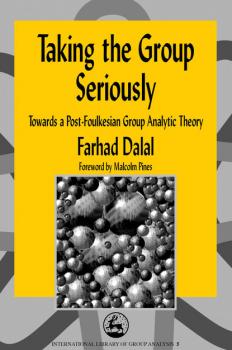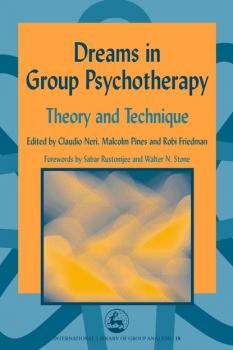International Library of Group Analysis
Скачать книги из серии International Library of Group AnalysisA Workbook of Group-Analytic Interventions
At last, a book on therapy which is easy to read and jargon-free, yet manages to convey the richness of the group experience.' – Penelope Campling, British Journal of Psychiatry 'It is vitalising reading – and should be on the shelves of any psychotherapy department and of any therapist with an interest in groups.' – Chris Evans, British Journal of Medical Psychology 'The purpose of this short, highly readable and extremely informative book is «to provide the reader with a practical insight into the group-analytic method of group therapy». The book achieves this goal through a format that is interactive with the reader.' – Jerome S. Gans, International Journal of Group Psychotherapy A Workbook of Group-Analytic Interventions is designed to complement the academic and experiential training of therapists. Written by experienced practitioners, it gives trainees a practical insight into the ways in which group analysts may tackle difficult situations, allowing them to understand more fully the nature of intervention right from the beginning of their training. Eight situations drawn from real psychotherapy groups are presented in detail so that readers may exercise their own skills in taking decisions and judging appropriate interventions. Each situation is then analysed in depth by one of the authors, who describe and comment on the thinking behind the interventions suggested by a panel of group analysts. The book gives the trainee a wide and informed appreciation of different situations arising in groups and appropriate ways of handling them. It provides an excellent base from which to start to practise.
Relational Group Psychotherapy
Integrating cutting-edge relational theory with technique, this volume reveals the deeply personal nature of the intersubjective process of group therapy as it affects the group therapist and other group members. By locating the group therapist's experience in the centre of the action, Richard M. Billow moves away from traditional approaches in group psychotherapy. Instead, he places emphasis on the effect of the therapist's own evolving psychology on what occurs and what does not occur in group psychotherapy. Building on Bion's early theory of group and his later formulations regarding the structure of thought and the role of affect, this work expands on the present understanding of relational theory and technique. Through the use of clinical anecdotes the author is able to ground theory in the realities of clinical experience making this essential reading for group psychoanalysts and psychotherapists, psychiatrists and other mental health professionals, academics and students of psychoanalytic theory.
The Social Unconscious
In this text, Earl Hopper has made a major contribution to the understanding of the depth and breadth of individuals and how we might help them to know more of their patterns of relatedness with others, inter-personally, socially and culturally. Of particular note is the open honest manner of his consideration of his counter-transference and these can be clearly observed in the abundance of pertinent vignettes. This book draws attention to theory and practice in relation to a side of therapeutic work insufficiently attended to and will reward readers at all stages of professional development. It is written in a clear, accessible style and manages to convey complex ideas in a readily comprehensible manner'. – Psychotherapy and politics international 'The Social Unconscious represents a line of thinking whose time has come. From bullying and youth violence in schools, to bombings in our cities, to anti-semitic or anti-Muslim activities and other race or religious hatred, to anxieties, well founded or otherwise, about immigration – wherever we live, all of us are touched and shaped by these events… This book draws attention to theory and practice in relation to a side of therapeutic work insufficiently attended to and will reward readers at all stages of professional development. It is written in a clear, accessible style and manages to convey complex ideas in a readily comprehensible manner.' – Psychotherapy & Politics International 'Dr Hopper argues for the awareness of, and training in, the processes of what he terms the Social Unconscious, for all mental health professionals. Hopper provides insight into the multiple forces that affect us and how we may reorganize our constraints. Does Hopper simply find what he is looking for, or does he discover something new? I recommend readers take this book of essays seriously and make their own decision.' – Psychologist – Psychoanalyst 'A very timely selection of papers by Earl Hopper on a very timely subject… People need to recognize that we are not merely passive sufferers of our world, rather we constitute it and have the power to shape it to a great extent. Much of what goes on in that world is unconscious in spite of the fact that we make it, therefore the importance of the social unconscious has been in the centre of Earl's interest for a number of years, and he has become one of the best known exponents of it.' – Reflections 'This most timely book – with its ready application across disciplines in a world fragmented by group-induced conflicts and traumas – will, no doubt, stimulate many thoughts, feelings and new possibilities for integration.' – Mark Ettin, Group Psychotherapist and Group Relations Consultant, USA 'The Social Unconscious offers a carefully composed selection of the author's group analytic contributions… the complexities of sociology, group analysis and psychoanalysis are put in mutually enriching perspectives.' – Dieter Nitzgen, Psychoanalyst and Group Analyst, Germany 'This record will be a lasting contribution to the literature. He movingly records with startling honesty the details of his family background and current history with poetic grace, thus applying what he has learned of the social unconscious to his own practice.' – W. Gordon Lawrence, Group Relations and Organizational Consultant, UK 'Earl Hopper's writing contributes a penetrating and unique view of pathology rooted in society as well as in the individual psyche.' – Dennis Brown, Psychoanalyst and Group Analyst, UK The social unconscious and its manifestations in group analysis are the focus of this important new book of Earl Hopper's selected papers. Drawing on sociology, psychoanalysis and group analysis, he argues that groups and their participants are constrained unconsciously by social, cultural and political facts and forces. These hypotheses are illustrated with clinical vignettes concerning anti-Semitism, racism, the politics of class and gender, and the effects of rapid social change. Transference and countertransference processes are examined both vividly and honestly. Theoretically generative and clinically astute, this book will be of value to both analysts and their students.
Building on Bion: Branches
This book has contributions, largely related to group analysis, from an international selection of well-known group analysts, psychologists, psychiatrists and academics. There is a very clear overview and précis of Bions's thoughts by James Grotstein followed by ten chapters each developing an aspect of Bion's ideas and work'. – Journal of Analytical Psychology 'Intended to deepen understanding of Bion's significant contributions in addition to assisting practitioners in the field of group analysis, these volumes constitute an impressive tribute to Bion, his work, and its current and future applications.' – Hamilton Alumni Review The enduring influence of Bion's work – the many rich applications of his ideas to group psychology, organizational dynamics and group therapy in the present day and looking to the future – is the central theme of this book. Chapters by distinguished international contributors from the fields of psychoanalysis, group analysis, management consultancy and social science cover work with large groups, Bion and the Tavistock conferences, and his ideas about thinking and learning, dreams and mentality. They clearly demonstrate Bion's originality and passion as he sought the distinctive essence of psychoanalytic learning and how such a pursuit and such learning can be shared and advanced. This is a collection of original and insightful papers which, along with its companion volume Building on Bion: Roots, deepens understanding of Bion's contributions to theory and practice, and is invaluable to those who work with groups, in both therapeutic and management contexts.
Building on Bion: Roots
Two volumes of original papers by leading thinkers and practitioners of group therapy… The diverse collection that has informed and stimulated my thinking.' – International Journal of Group Psychotherapy 'The concepts that I liked were about the truth, the unknowable and unknown, and the functions he devised to communicate what is going on in the patients' world to other psychoanalyst. I am glad that I read these books with their wide range of ideas and I have gained insights which will make me more aware in my psychodrama practice.' – British Journal of Psychodrama. 'The book begins with a wonderful introduction by James Grotstien, a theorist whose grasp of Bion is enriched by his own formidable ideas. He sets the stage for what's to follow, toucing on Bion's groundbreaking work with groups, his formalizing of psychotic experience and several key concepts, like Bion's elaboration on the concept of projective identification. Grotstien's prose is remarkable. He conveys ideas about the most complex internal states with a clarity and reach that is unparalled, even by Bion himself. This is without a doubt a richly rewarding and ultimately exhausting text.' – www.mentalhelp.net This stimulating collection of papers by distinguished international contributors from the fields of psychoanalysis, group analysis, management consultancy and social science explores formative influences affecting Bion's emotional and intellectual development. The authors revisit in depth the origins of Bion's ideas, setting them in the context of his World War I experiences, his contact with Trotter, and his later work with the Tavistock Clinic and psychoanalysis. Chapters discuss the roots of his epistemology, re-examining and extending basic assumption theory; links between Bion and Foulkes; group mentality and Bion in Italy. Through these the spirit and shape of his work can be discovered by those new to Bion, and rediscovered by those who feel well acquainted with him. This is a collection of original and insightful papers which, along with its companion volume Building on Bion: Branches, will not only deepen understanding of Bion's contributions to theory and practice, but will also be invaluable to those who work with groups, in both therapeutic and management contexts.
Taking the Group Seriously
In this critique and extension of the work of S.H.Foulkes, Farhad Dalal presents a thorough contemporary appraisal of the theory of group analysis and its relevance to psychoanalysis as a whole. The author argues that Foulkes failed to develop a specific set of group concepts, relying instead on the traditional individualistic framework of Freud. The book explores why Foulkes failed to escape from the orthodox mother-infant paradigm and offers a new post-Foulkesian interpretation of group analytic theory. Taking the Group Seriously is divided into six parts which trace the history of ideas behind group work, and draws on a wide range of subjects to support its thesis: not only psychoanalysis and group analysis, but also sociology, biology, chaos theory, genetics, economics, game theory and discourse theory. Using the author's practical group experience and including the latest ideas on the subject, this volume will be of interest to all those working in the field of psychoanalysis.









